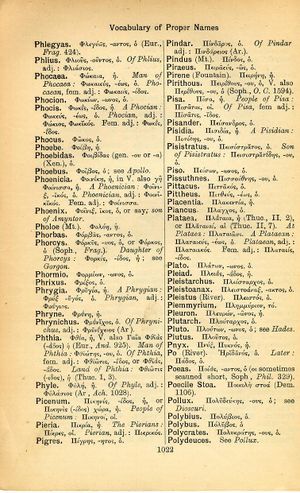Pluto
τὸ κακὸν δοκεῖν ποτ' ἐσθλὸν τῷδ' ἔμμεν' ὅτῳ φρένας θεὸς ἄγει πρὸς ἄταν → evil appears as good to him whose mind the god is leading to destruction (Sophocles, Antigone 622f.)
English > Greek (Woodhouse)
Latin > English (Lewis & Short)
Plūto: or Plūton, ōnis, m., = Πλούτων,
I the king of the Lower World, the husband of Proserpine, and brother of Jupiter and Neptune, Cic. N. D. 2, 26, 66; Hyg. praef.; Verg. A. 7, 327; Juv. 13, 50.—Acc. Gr. Plutona, Hor. C. 2, 14, 7.—Hence,
II Plūtōnĭus, a, um, adj., of or belonging to Pluto, Plutonian: et domus exilis Plutonia, i. e. the realms. of death, the Lower Regions, Hor. C. 1, 4, 17.—Subst.: Plūtō-nĭa, ōrum, n. plur., a pestilential district in Asia, Cic. Div. 1, 36, 79.
Latin > French (Gaffiot 2016)
Plūtō (-tōn), ōnis, m. (Πλούτων), Pluton [fils de Saturne et d’Ops, frère de Jupiter et de Neptune, dieu des enfers] : Cic. Nat. 2, 66 ; Virg. En. 7, 327 || -tōnĭus, a, um, de Pluton : Hor. O. 1, 4, 17 || -tōnĭa, ōrum, n., région empestée de l’Asie : Cic. Div. 1, 79.

